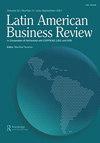Nostalgia in Brazilian Mass Media Advertising: A Semiotic Perspective
IF 0.7
Q3 Business, Management and Accounting
引用次数: 1
Abstract
Abstract This article seeks to (a) identify and problematize how the themes of history and nostalgia are used in the advertising discourse used—by the Brazilian mass media; and (b) explore the meanings awakened in consumers by the discourse in question. The data used was based on more than four hundred Brazilian magazine advertisements, from 2008 to 2016, and on the testimonials taken from consumers in 2016 using focus groups. The analyses identified five categories utilizing the theme of history: history as a signature; history as a commemoration; history as an opportunity; history as a focus; and history as a support. In the case of the consumers’ discourse, their comments were more focused on a consideration of the credibility of the advertisements and the longevity of the organizations in question that on any traces of nostalgia. It was also noted that the convergence between tradition and innovation (usually dichotomic concepts) was considered not problematic by the subjects. Finally, the theoretical perspective of French semiotics indicated how the body of advertisements and consumer testimonials could support a view of nostalgia as being a mythical discourse that constructs meaning based on the juxtaposition of tradition/innovation.巴西大众媒体广告中的怀旧:一个符号学的视角
摘要:本文旨在(a)确定历史和怀旧的主题是如何在巴西大众媒体使用的广告话语中使用的,并提出问题;(b)探讨相关话语在消费者中唤醒的意义。所使用的数据基于400多份巴西杂志广告,从2008年到2016年,以及2016年通过焦点小组从消费者那里获得的推荐。分析确定了利用历史主题的五个类别:作为签名的历史;作为纪念的历史;作为机遇的历史;以历史为重点;还有历史作为支持。在消费者话语的情况下,他们的评论更多地集中在考虑广告的可信度和相关组织的寿命,而不是任何怀旧的痕迹。还有人指出,各专题认为传统与创新(通常是二分概念)之间的汇合没有问题。最后,法国符号学的理论视角表明,广告和消费者评价的主体如何支持怀旧作为一种神话话语的观点,这种话语基于传统/创新的并立而构建意义。
本文章由计算机程序翻译,如有差异,请以英文原文为准。
求助全文
约1分钟内获得全文
求助全文
来源期刊

Latin American Business Review
Business, Management and Accounting-Business and International Management
CiteScore
2.40
自引率
0.00%
发文量
6
期刊介绍:
Latin American Business Review is a quarterly, refereed journal which facilitates the exchange of information and new ideas between academics, business practitioners, public policymakers, and those in the international development community. Special features of the journal will keep you current on various teaching, research, and information sources. These activities all focus on the business and economic environment of the diverse and dynamic countries of the Americas.
 求助内容:
求助内容: 应助结果提醒方式:
应助结果提醒方式:


